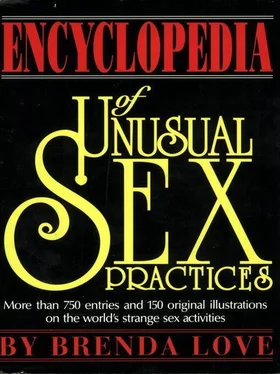Brenda Love - Encyclopedia of Unusual Sex Practices
Здесь есть возможность читать онлайн «Brenda Love - Encyclopedia of Unusual Sex Practices» весь текст электронной книги совершенно бесплатно (целиком полную версию без сокращений). В некоторых случаях можно слушать аудио, скачать через торрент в формате fb2 и присутствует краткое содержание. Город: New York, Год выпуска: 1992, ISBN: 1992, Издательство: Barricade Books Inc., Жанр: Энциклопедии, Эротика, Секс, на английском языке. Описание произведения, (предисловие) а так же отзывы посетителей доступны на портале библиотеки ЛибКат.
- Название:Encyclopedia of Unusual Sex Practices
- Автор:
- Издательство:Barricade Books Inc.
- Жанр:
- Год:1992
- Город:New York
- ISBN:0-942637-64-X
- Рейтинг книги:4 / 5. Голосов: 1
-
Избранное:Добавить в избранное
- Отзывы:
-
Ваша оценка:
- 80
- 1
- 2
- 3
- 4
- 5
Encyclopedia of Unusual Sex Practices: краткое содержание, описание и аннотация
Предлагаем к чтению аннотацию, описание, краткое содержание или предисловие (зависит от того, что написал сам автор книги «Encyclopedia of Unusual Sex Practices»). Если вы не нашли необходимую информацию о книге — напишите в комментариях, мы постараемся отыскать её.
Encyclopedia of Unusual Sex Practices — читать онлайн бесплатно полную книгу (весь текст) целиком
Ниже представлен текст книги, разбитый по страницам. Система сохранения места последней прочитанной страницы, позволяет с удобством читать онлайн бесплатно книгу «Encyclopedia of Unusual Sex Practices», без необходимости каждый раз заново искать на чём Вы остановились. Поставьте закладку, и сможете в любой момент перейти на страницу, на которой закончили чтение.
Интервал:
Закладка:
In modern societies, adultery became a threat to the family unit. It was still tolerated, but most often in the form of prostitution. The Bible provided one of the first restrictions against adultery for women, but even then women were rarely punished. Numbers V tells of a ritual used to expose adulterous women. Most people, unfamiliar with Jewish history, interpret this adultery test as unfair, chauvinistic, and cruel. In reality, no guilty woman’s stomach ever swelled and caused death as the law warned. The test consisted of simply dissolving the ink inscription of god’s name off a parchment with water. The intention of the rabbi or priest was to restore the husband’s faith in his wife and therefore discourage divorce or retribution. This was done without regard to her guilt or innocence. The test eventually lost its credibility because all the women proved innocent by the application of this test.
Adultery continued to be tolerated by societies that practiced pre-arranged marriages or that enforced laws against divorce. Catholicism did not campaign to stop adultery but had its influence by primarily condemning the sex act; for them adultery did not carry much more stigma than carnal lust in marriage. The first real campaign against adultery came from the Protestant reformation. The Protestant leaders thought it wiser to discourage arranged marriages and to sanction sex within a marriage. Their hope was that families would be bonded more closely if couples married for love. In turn, the Protestant ecclesiastical courts demanded chastity until engagement, and fidelity forever after. This law was for the economic protection of a society that did not have a welfare system or a job market for women.
The English Puritans, upon relocating to the Colonies, abolished the ecclesiastical courts and made sex offenses capital crimes in civil courts. There are still many states that have statutes and penalties against adultery. Enforcement, however, has become impossible due to increased anonymity in metropolitan areas and a lack of motivation by neighbors or relatives to report offenders, among other factors.
The Puritans must have been appalled when they were first exposed to the open sexuality of the adjacent Indian culture. John D’Emilio and Estelle Freedman, in their book Intimate Matters, A History of Sexuality in America, discuss the sex habits of Puritans and American Indians during this time. The Indians unabashedly practiced homosexuality, adultery, polygamy, transvestism, and zoophilia. Likewise, being human, not all of the Puritans remained pious and many of those who settled in Plymouth openly adopted these Indian customs, even reviving some of the pre-Christian religious fertility ceremonies. The leader, Thomas Morton, was eventually deported to England for a while, and only returned shortly before his death. In time, the majority of Puritans prevailed and forced all settlers in the new colonies to follow the Puritan code of morality.
This intolerance, however, was not restricted to their fellow colonists; it was imposed on the surrounding Indian tribes as well. In Women and Colonization: Anthropological Perspectives (quoted in Intimate Matters), a Jesuit, confronting a Montagnais Indian, said, “It is not honorable for a woman to love anyone else except her husband,” for this sexual promiscuity meant that a man “was not sure that his son… was his son.” The Indian, pointing out the cultural differences of the intruder, replied, “You French people love only your own children, but we love all the children of our tribe.” This attitude made unwanted pregnancies and split families less of a psychological burden. Women and children were also recognized as valuable and their contributions to the success of the tribe were viewed as equitable and necessary. The Indians, unlike the Europeans, did not use wages, sexual fidelity, and closed educational institutions to suppress women. Colonists later used the promiscuity and cultural differences of the Indians as proof of the latter’s racial inferiority. This helped the colonists to justify their extermination program.
Adultery was also tolerated by societies when the ratio of men to women was disproportionately high, or when the offense was by a man against a lower status slave, servant, or prostitute.
Today, there seem to be differences between male and female affairs. Men usually are not looking for a replacement for their wives. They use adultery to relieve stress, alleviate boredom, get revenge, remedy a lack of affection from a spouse, temporarily escape responsibility, boost their ego, increase their sexual knowledge and proficiency, or to ease the transition period between being a promiscuous bachelor and being married. Many men also marry for practical reasons and not because the one chosen was the most sexually appealing. Women have affairs for many of the same reasons, but tend to fall in love with their new partner much more often. This can be a problem, because, unlike men who may also fall in love, women are less likely to separate sex from responsibility and often do not give up their lovers simply to keep peace in the family.
Affairs are often painful for the single partner. While they may feel a high level of self-esteem initially, it is depleted when the adulterer goes home every night to someone else. Often in the end the person who was the center of the adulterer’s world becomes an embarrassment, a mistake, or a scapegoat, so that breaking up becomes the only remedy.
Spouses desiring an open marriage may be able to negotiate for what they feel is necessary for their emotional survival. However, much depends on the value their partner places on fidelity. Statistics show that most people don’t file for divorce on a first offense, but one can expect spouses who feel helpless and betrayed to go through a stage of wanting to control or know about all their partner’s activities. This is temporary and necessary for some to reestablish trust in a partner’s fidelity. Others may seek revenge by having an affair with a close friend or relative of their spouse.
Married partners who accept an open marriage will generally negotiate for things such as secrecy, discretion, restriction on gifts, time allocated, locations for sex, type of person selected, type of sex, safe sex, etc. Some couples use group sex with strangers as an equitable compromise because both parties are present and there are very few emotional liaisons established in this environment. Nonmonogamous marriages, whether consensual or undiscovered, are thought to take longer to break up because the adulterous partner is usually happy and rarely takes out their frustrations on their spouse. There are exceptions, for while some adulterers will feel guilty and treat their partners with more respect, others turn guilt into hostility and false accusations against their spouses.
Adultery involving homosexuality can be traumatic to the spouse who has a limited interpretation of human sexuality, thereby adding more guilt and shame to the event. Counseling is beneficial for most people who find themselves in this predicament. The book by Jean Schaar Gochros, Ph.D., entitled When Husbands Come Out of the Closet, may be of benefit for those facing this particular problem.
CAUTION: An assumption of implied consent regarding open marriages or use of deceit may have severe consequences. Diseases and unwanted pregnancies can also create problems.
(See also CANDAULISM, CUCKOLDRY, GROUP SEX, FESTIVALS, HAREMS. HETAERAE, ILLEGAL SEX, LOVE POTIONS, MARRIAGE, MENAGE A TROIS, PROSTITUTION and WIFE SWAPPING)
AGALMATOPHILIA(Galateism, Pygmalionism, Statuophilia) Pygmalion was a mythical Greek sculptor who fell in love with Galatea (one of his female statues). At his request, the goddess Aphrodite brought her to life. Today this term refers to people with a statue or mannequin fetish.
Читать дальшеИнтервал:
Закладка:
Похожие книги на «Encyclopedia of Unusual Sex Practices»
Представляем Вашему вниманию похожие книги на «Encyclopedia of Unusual Sex Practices» списком для выбора. Мы отобрали схожую по названию и смыслу литературу в надежде предоставить читателям больше вариантов отыскать новые, интересные, ещё непрочитанные произведения.
Обсуждение, отзывы о книге «Encyclopedia of Unusual Sex Practices» и просто собственные мнения читателей. Оставьте ваши комментарии, напишите, что Вы думаете о произведении, его смысле или главных героях. Укажите что конкретно понравилось, а что нет, и почему Вы так считаете.












![Джейн Остин - Love and Freindship [sic]](/books/748741/dzhejn-ostin-love-and-freindship-sic-thumb.webp)